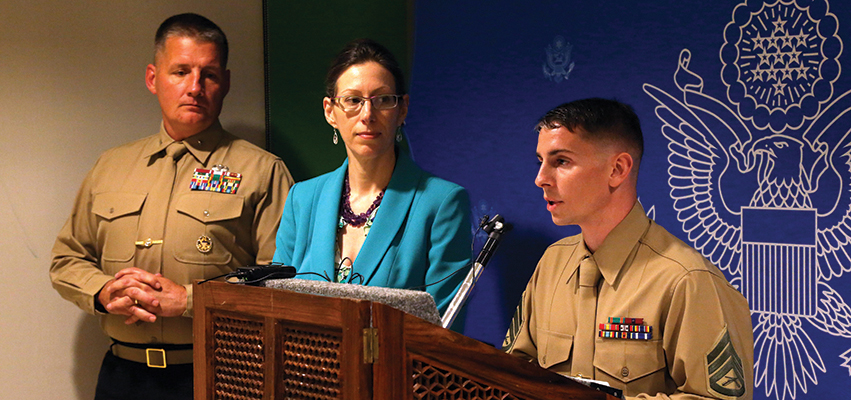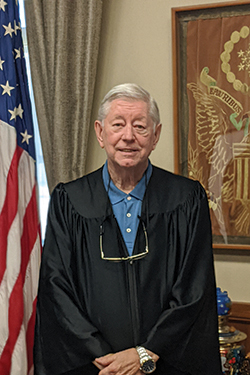Peorians Play on the World Stage

The Peoria Area World Affairs Council (PAWAC) “brings the world to central Illinois” through monthly programs on foreign affairs and international relations. Distinguished ambassadors, diplomats and leaders from across the globe address members of the Peoria public. Sometimes, however, this situation is reversed, as our own community sends diplomats out onto the global stage.
Such has been the case with the following three Peorians, who have been major players in diplomacy and international affairs across the decades. The history of the last century is punctuated by two world wars, the collapse of the Soviet bloc, and the rise of extremism and global terror networks. Each of these periods is represented among these three diplomats, demonstrating the ever-evolving challenges each generation faces in maintaining American relationships with the rest of the world.
Ambassador Alaina Teplitz (1969 - )
What do the Mandarin Chinese, Mongolian, Albanian and French languages have in common? Hint: it’s not something linguistic. Rather, they are all languages Ambassador Alaina Teplitz has acquired through her career in foreign service. This Peoria native has served twice so far as ambassador, first to Nepal and currently to Sri Lanka and the Maldives. The latter appointment is one of the few ambassadorships with responsibility for more than one country.
Both are island nations in the Indian Ocean. However, Sri Lanka is home to nearly 22 million people, while the population of the Maldives is under 400,000. Although geographically close, these South Asian neighbors have very different demographics, economies and cultural landscapes. It is Teplitz’s job to know the situation on the ground in each. For an ambassador, this can mean being prepared to deal with any kind of crisis, whether political upheaval, natural disaster, or more recently, COVID-19.
Ambassador Teplitz is no stranger to dealing with crisis. She and other American embassy personnel were airlifted out of Tirana, Albania when violence broke out there—while she was eight months pregnant. She has served in other hot spots such as Kabul, Afghanistan. Only a few weeks after being appointed ambassador to Nepal in April 2015, a 7.8 magnitude earthquake killed 9,000 people in and around the capital Kathmandu. In addition to the aftermath of that natural disaster, Nepal was also putting a new constitution into place at the time.
Most recently, Ambassador Teplitz led the American response to the Easter bombings in the Sri Lankan capital Colombo in 2019, when Islamic extremist suicide bombers initiated explosions in churches and luxury hotels commonly used by foreigners. Throughout her career, other posts have taken her to Australia, Belgium and Bangladesh, as well as assignments with NATO and the European Union.

The Honorable Michael Mihm (1943 - )
Some of the Honorable Michael Mihm’s best friends are people he can’t talk to without an interpreter. That’s because of his second career outside the courtroom. A federal judge for most of his adult life, Judge Mihm has traveled the world as an ambassador for a free and independent judiciary, interacting with judges from 45 countries.
After the collapse of the Soviet Union, Chief Justice William Rehnquist personally asked Mihm to chair the newly-created Committee on International Judicial Relations. The group was created to handle the influx of requests in the early 1990s from Eastern European nations who, as newly minted democracies, were creating all-new civil institutions, including independent judicial systems. Since then, this work has expanded beyond the former Soviet bloc to a worldwide program.
Judge Mihm recalls the “great winds of change” in the early 1990s when America had an opportunity to provide a model for nations turning away from communism. On one occasion, while on coffee break at a conference, he was asked by attendees to suggest wording for their constitution, which they were drafting at that time. Those were “the barnstorming days” when there was “no script or frame of reference for these things,” says Mihm, unless the U.S. stepped up with guidance on principles the average American might take for granted, such as rule of law, an independent judiciary, transparency to the public, and separation of powers.
According to the U.S. Russia Foundation—on whose board of directors Judge Mihm has served since 2009—he and Minnesota federal judge Paul Magnuson “were the primary contacts of the American federal judiciary to the Library of Congress Open World Program, which has brought over 1,000 Russian judges to the U.S. to see firsthand how our judiciary operates.” For his many contributions to promoting the rule of law in Russia, USAID bestowed Judge Mihm with the USAID Outstanding Citizen Achievement Award in 2004. He also serves as a member of the National Committee on U.S.-China Relations.
While most of Judge Mihm’s work has been in Russia, where he has traveled 19 times, he has also worked with judges in East Asia, Central Asia, Latin America and Europe. While he and other judges routinely traveled overseas to lead trainings, the reverse was true as well. Judges and lawmakers from abroad came to the U.S. through an exchange program, staying in the homes of committee members and others in the local community, including Peoria.
Judge Mihm recalls some of the most meaningful exchanges of ideas happening in these personal contexts. Many participants on both sides developed working relationships and friendships that lasted decades, including extended families keeping in touch.
Ambassador William Eagleton (1926 - 2011)
Public service was a way of life stretching back generations for the family of noted Ambassador William Eagleton. The late Bill Eagleton was the first, however, to go into diplomacy. “Foreign service was his life,” explains his younger brother, Peoria Judge Richard Eagleton. Judge Eagleton recalls that his brother was a linguist first, starting with French and Spanish. His interest in foreign affairs was sparked by a teacher at Peoria High School, from which he graduated in 1943. History teacher Y.A. Hagen emigrated from Russia following World War I and impressed upon his students the real-world consequences that international relations have on people’s lives.
After several years of service in the Navy and a degree from Yale University, Eagleton joined the Foreign Service in 1949. He studied French and Spanish in Europe, but quickly switched to Arabic as he saw how the Middle East was changing in the postwar period. Through the course of his service, he became fluent in many dialects of Arabic and learned the language Farsi (spoken in Iran) and especially Kurdish—spoken by Kurds throughout areas of Iraq, Turkey, Syria and Iran.
In fact, Kurdish affairs were a specialty of Eagleton’s throughout his career. He wrote two books on the subject more than 20 years apart—one a history of the year-long independent Kurdish republic, and the other on the subject of Kurdish rugs. His 1988 text on the subject is still the definitive text for weaving experts and collectors.
Eagleton served as charge d’affaires, consul general, ambassador, special advisor and many other diplomatic roles in hot spots throughout the Middle East and North Africa. In several cases early in his career, he was sent by the State Department to pave the way for formal diplomatic relations. He helped establish official embassies on more than one occasion.
Always ready for the next assignment, Eagleton served in Aden both before and after it became part of Yemen. Other postings included Syria, Lebanon, Iran, Iraq, Algeria, Libya, Mauritania, Spain and England. After four-plus decades in the Foreign Service, he had several appointments through the United Nations and even returned to the State Department as an advisor on Iraq following the second Gulf war. PM
Kathryn Eissfeldt is the incoming president of the Peoria Area World Affairs Council, which celebrates its 50th anniversary this year. For more information, visit pawac.org.
- Log in to post comments

